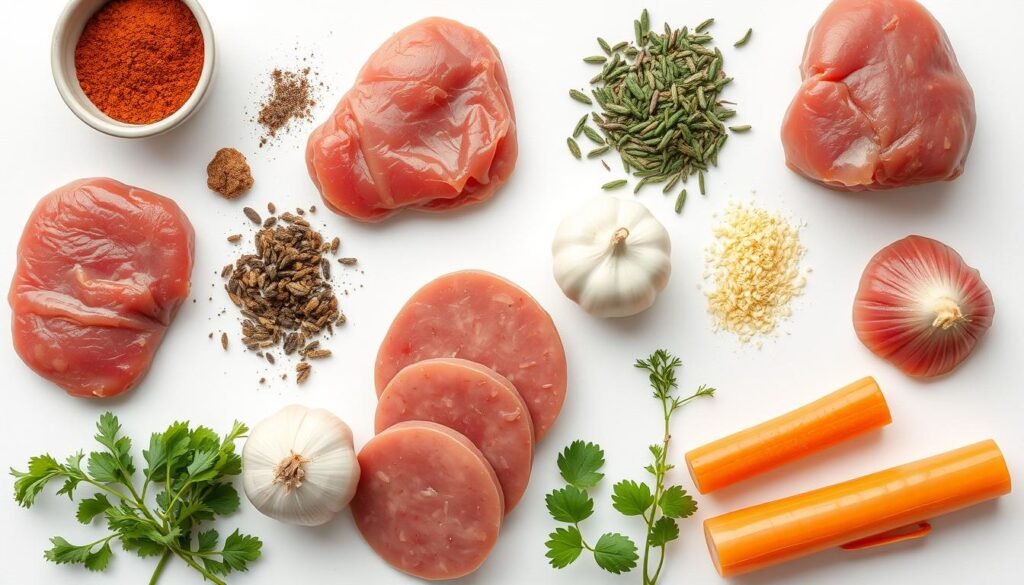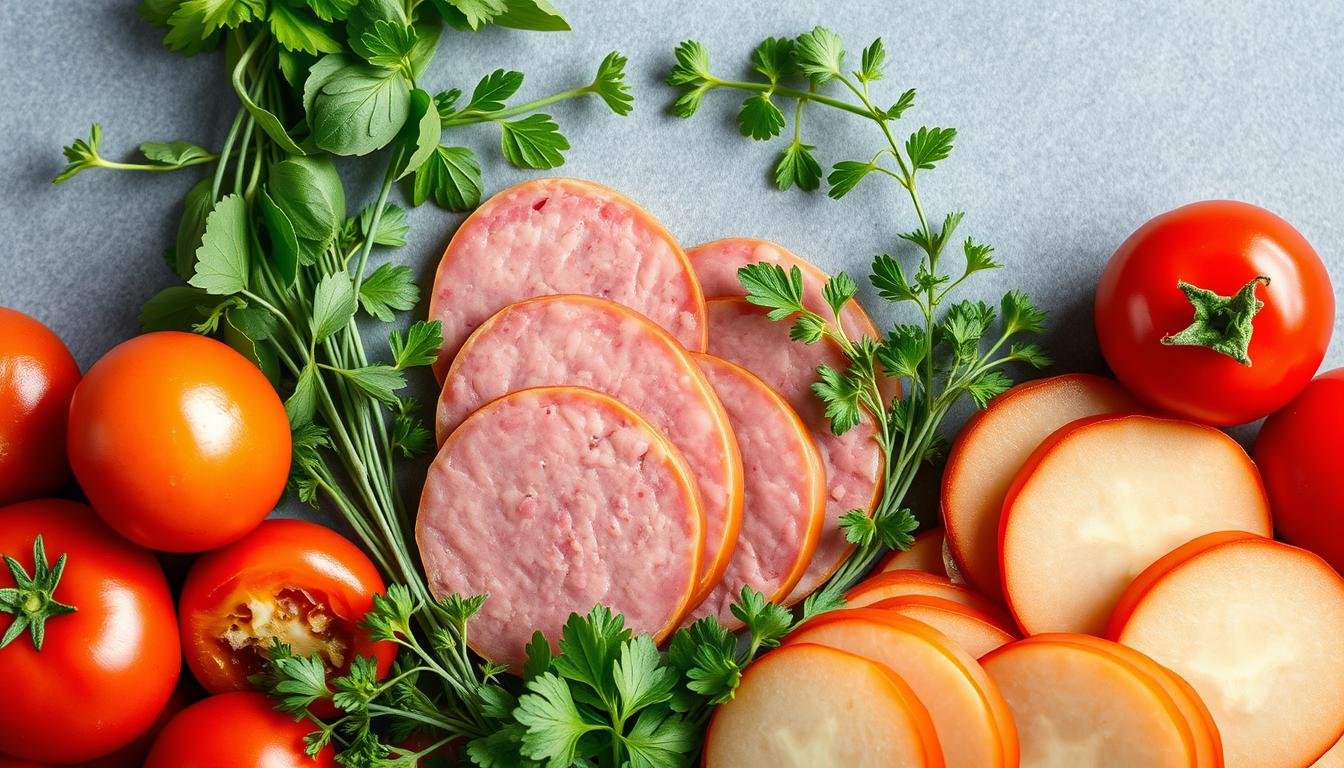Did you know a small amount of liverwurst, just 0.25 cup (55 gram), has a lot of nutrients? It has 168 calories, 14 grams of fat, and 5.46 grams of saturated fat. It also has 64.9 milligrams of cholesterol and 385 milligrams of sodium1. This sausage is not just tasty; it’s also packed with vitamins A, B6, B12, and minerals like selenium, magnesium, and zinc1.
Even a small amount, a quarter-cup, gives you 123.67% of the daily vitamin B12 you need. Vitamin B12 is important for your nerves1. So, is liverwurst a healthy choice or just a treat? Let’s look at both sides of the coin.
Key Takeaways
- Liverwurst is a nutrient-dense food, providing significant amounts of vitamins A, B12, iron, and selenium.
- A serving of liverwurst can deliver over 120% of the daily recommended intake of vitamin B12.
- Liverwurst is a good source of complete protein, with almost 7 grams per 0.25 cup serving.
- However, liverwurst can also be high in sodium and saturated fat, which may be a concern for some individuals.
- The quality and preparation of liverwurst can impact its overall nutritional profile and potential health benefits.
What is Liverwurst?
Liverwurst, also known as liver sausage, is a traditional sausage. It’s mainly made from ground liver and other organ meats2. This food is packed with nutrients and has a long history in European cuisine2.
The ingredients in liverwurst can change, but it often includes beef, veal, pork, sheep, or goat liver. It also has a mix of seasonings and spices2. Herbs like marjoram, allspice, thyme, and black pepper add to its unique taste2.
Liverwurst can be found in fresh, spreadable, or smoked forms. It’s often eaten on bread or crackers with mustard, pickles, or onions2. This sausage is loved not just in Europe but also in North America, where it’s common in delis and stores2.

Liverwurst Nutrition
Liverwurst is a food full of vitamins and minerals2. It’s rich in protein, vitamin A, iron, and B vitamins. This makes it great for a balanced diet3. It also has healthy fats like monounsaturated and polyunsaturated fats3.
Compared to other liver sausages, liverwurst is leaner. It has less fat and calories but still tastes rich4. But, it does have some cholesterol. So, it’s best to eat it in small amounts for a healthy lifestyle4.
“Liverwurst is a nutrient-dense food that provides a significant amount of essential vitamins and minerals.”
Liverwurst Ingredients and Varieties
Liverwurst, also known as liver sausage, is a tasty and versatile meat product. It comes in many flavors and types. It’s made from liver, pork, and beef, mixed with savory seasonings5.
The ingredients and how much of each can change a lot between brands. Some liverwurst has more beef liver, while others have more pork5. Spices like coriander, thyme, nutmeg, and garlic are added, making each type unique5.
| Liverwurst Ingredient | Nutritional Benefits |
|---|---|
| Liver | Rich in vitamins A, D, and B vitamins like B125. It also has minerals like copper, zinc, chromium, and iron5. Liver helps remove toxins from the body5. |
| Pork and Beef | High in protein, with 9g in Braunschweiger6. Braunschweiger also has 25% of your daily iron needs6. |
| Spices and Herbs | Give flavor and aroma, and might add extra nutrition. |
Whether you like pork or beef liver sausage, there’s a liverwurst for everyone56.

For the best taste and nutrition, choose liverwurst from trusted, organic sources5. Look for high-quality, preservative-free liverwurst at Whole Foods Market, like Denver’s Continental Sausage5. You can also try making your own liverwurst with recipes from Nourishing Traditions56.
Liverwurst Nutrition Facts
Liverwurst is a nutritious food that’s full of vitamins, minerals, and macronutrients. A 0.25 cup (55 gram) serving has 168 calories and 14g of total fat. It also has 5.46g of saturated fat and 6.76g of monounsaturated fat7.
It has 64.9mg of cholesterol and 385mg of sodium. You’ll also get 93.5mg of potassium, 3.24g of total carbs, and 1.38g of fiber7. Plus, it has 0.9g of sugar and 6.82g of protein7.
Liverwurst is packed with essential vitamins and minerals. It’s a great source of vitamin A, vitamin B6, and vitamin B12. It also has selenium7.
It’s rich in iron, magnesium, zinc, phosphorus, calcium, and copper7.
| Nutrient | Amount per 100g | % Daily Value |
|---|---|---|
| Protein | 15g | 30% |
| Vitamin B12 | 83.7μg | 837% |
| Vitamin A | 4,690μg | 469% |
| Iron | 3.9mg | 22% |
| Selenium | 31.7μg | 45% |
Liverwurst is a traditional German product loved for its taste and nutrition8. It can be frozen for up to 2 months if not eaten within 4-6 days8.
While liverwurst is nutritious, it’s best to eat it in moderation. It has high cholesterol and can cause vitamin A toxicity if eaten too much7. There are also concerns about antibiotic residues and interactions with medications7.
It’s wise to talk to a healthcare provider before adding liverwurst to your diet7.
Is Eating Liverwurst Good for You?
Liverwurst can be a nutritious part of your diet if eaten in small amounts. This German-style sausage is packed with vitamins, minerals, and healthy fats from ground pork liver and offal1.
A 0.25 cup (55 gram) of liverwurst spread has 168 calories, 14 grams of fat, and 6.82 grams of protein1. It’s also rich in vitamins A, B6, B12, and C, along with minerals like selenium, magnesium, zinc, and iron1. It’s especially high in vitamin B12, giving you over 120% of your daily needs1.
Even though liverwurst has a lot of sodium, it’s still good for you in small amounts1. Choosing high-quality, ethically-raised meats makes it even healthier1.
Liverwurst Nutrition and Health Benefits
Liverwurst is full of protein, healthy fats, and important vitamins and minerals9. It has about 28 grams of fat per 100-gram serving, with 11 grams of saturated fat and 153 milligrams of cholesterol9. But it also has a lot of protein, about 14 grams per serving9.
It’s rich in vitamins A, B12, and B2, and the mineral selenium, giving you 105% of your daily value in one serving9. It also has a lot of iron, giving you 36% of your daily needs9.
Eating liverwurst can help with brain function, bone health, liver health, and reduce inflammation9. But, it’s best to eat it in small amounts because of its high sodium and cholesterol9.
When picking liverwurst, choose products made from high-quality, ethically-sourced meats and organs. Jones Braunschweiger is a good choice because it’s gluten-free and has no artificial additives1.
“Liverwurst can be a surprisingly nutritious addition to your diet when consumed in moderation.”
Liverwurst can be a healthy choice if you eat it in the right amounts. It’s packed with nutrients that support your health. Just remember to eat it as part of a balanced diet.
Potential Health Benefits of Liverwurst
Liverwurst is packed with nutrients that can boost your health. It’s a rich source of vitamins A, B12, iron, selenium, and zinc10. These nutrients help keep your energy up, support your brain, and strengthen your immune system.
Liverwurst is also high in protein10. A 100-gram serving has about 15 grams of protein. This makes it great for those looking to increase their protein intake10. Protein is key for muscle repair and metabolism.
It’s also a big source of vitamin B1210. Vitamin B12 is crucial for nerve health, red blood cells, and the brain10. A 100-gram serving of liverwurst gives over 500% of the daily B12 you need9. This is especially important for vegetarians and vegans.
Liverwurst also has lots of vitamin A10. Vitamin A is good for your eyes, immune system, and skin10. A 100-gram serving has over 900% of the daily vitamin A you need9. It’s vital for healthy vision and skin.
It’s also a good source of iron, selenium, and zinc10. Iron helps carry oxygen and produce energy. Selenium and zinc are antioxidants that boost your immune system10. Adding liverwurst to your diet can help meet your mineral needs.
Even though liverwurst is nutritious, eat it in moderation. It has a lot of saturated fat and cholesterol911. Too much can raise your risk of heart disease and stroke11. Always talk to a doctor before adding liverwurst to your diet.
| Nutrient | Amount per 100g serving | % of Recommended Daily Value |
|---|---|---|
| Protein | 13-15g | N/A |
| Vitamin A | 922mcg | 922% |
| Vitamin B12 | 42mcg | 561% |
| Iron | 5.4mg | 36% |
| Selenium | 73.5mcg | 105% |
| Zinc | 2.2mg | 16% |
In summary, liverwurst can be a healthy part of a balanced diet. It’s full of vitamins, minerals, and protein10911. But, it’s important to eat it in moderation and consider your health to get the most benefits.
Potential Downsides of Liverwurst
Liverwurst can be good for you, but it has some downsides. A 55g serving has 385mg of sodium, which is 16% of what you should eat daily9. It also has a lot of cholesterol, with 64.9mg in a 55g serving9.
Liverwurst can also cause vitamin A toxicity. A 100g serving has 27,667.0 IU of vitamin A9. Eating too much can make you feel sick, give you headaches, and even harm your liver9. It’s best to eat liverwurst only 1-3 times a week9.
Even though liverwurst is nutritious, it’s important to eat it in moderation. This way, you can enjoy its taste and health benefits without harming your health.
Nutritional Breakdown of Liverwurst
| Nutrient | Amount per 100g | % Daily Value |
|---|---|---|
| Total Fat | 28g9 | – |
| Saturated Fat | 11g9 | – |
| Cholesterol | 153mg9 | – |
| Sodium | 860mg9 | 42%3 |
| Carbohydrates | 2g9 | – |
| Protein | 14g9 | 15%3 |
| Vitamin A | 27,667.0 IU9 | 469%3 |
| Vitamin B12 | 13.5μg9 | 837%3 |
| Iron | 6.4mg9 | 62%3 |
| Selenium | 58.0μg9 | 105%3 |
“Consuming liverwurst in excess can lead to symptoms such as nausea, headaches, and even liver damage due to its high vitamin A content.”
While liverwurst is nutritious, it’s key to eat it in moderation. This way, you can enjoy its taste and health benefits without harming your health.
How to Incorporate Liverwurst Into Your Diet
Liverwurst is a tasty and versatile ingredient that can be part of a healthy diet12. You can enjoy it as a sausage or a spread. There are many ways to add liverwurst to your meals12.
Spreading liverwurst on bread or crackers makes for a quick snack12. You can also add it to soups, stews, or casseroles for extra nutrition and flavor12. For a bigger meal, pan-fry liverwurst slices with eggs, potatoes, or veggies12.
For a culinary adventure, try liverwurst in different recipes12. You can make hidden liver meatballs, bacon-wrapped sliders, fried liverwurst, or homemade German liverwurst12. These dishes offer a tasty way to enjoy liverwurst’s nutritional benefits13.
Remember to watch your portion sizes and choose high-quality liverwurst12. This way, you get the most nutritional value from it12.
Exploring liverwurst’s many uses opens up a world of tasty and healthy options12. Whether as a spread, sausage, or recipe ingredient, liverwurst enriches your diet12.
Choosing High-Quality Liverwurst
To enjoy liverwurst’s benefits without its downsides, choose products from high-quality, ethically-raised animals. Opt for liverwurst made from grass-fed, pasture-raised animals without added sugars, fillers, or preservatives. This will give you the most nutrients and flavor14. On the other hand, mass-produced liverwurst with many additives can reduce nutritional value and increase health risks.
When shopping, look for organic and grass-fed liverwurst. These options taste better and offer more vitamins, minerals, and healthy fats15. Stay away from brands using low-quality meat or relying on fillers and preservatives to extend shelf life.
Prioritizing Ethical and Sustainable Sourcing
Choosing liverwurst from companies that focus on ethical and sustainable practices is key. Seek out liverwurst from small, local producers who work with farmers who care about animal welfare and the environment.14 These artisanal products might be pricier, but they offer better taste and nutrition.
Quality is more important than quantity when it comes to liverwurst. Choose smaller, high-quality servings of grass-fed, organic liverwurst. You’ll get a delicious and nutritious addition to your diet15.
| Liverwurst Criteria | Optimal Characteristics |
|---|---|
| Source | Grass-fed, pasture-raised animals |
| Ingredients | No added sugars, fillers, or preservatives |
| Production | Small, local producers with ethical sourcing |
“I absolutely love the liverwurst my Nana used to make. The texture and flavor are just unbeatable compared to the store-bought stuff.”
– Heather A., Boston
By choosing high-quality, ethically-sourced liverwurst, you can enjoy its nutritional benefits without the downsides. Spend time finding the best liverwurst options. Your taste buds and body will appreciate it1415.
Conclusion
Liverwurst can be a great choice for a healthy diet if it comes from high-quality, ethically-raised animals. It’s packed with vitamins, minerals, and other nutrients. Liverwurst is rich in essential nutrients like vitamin A, vitamin B12, vitamin B6, iron, zinc, and copper16. These nutrients help with immune function, vision, red blood cell production, and nerve health16.
The high-quality protein in liverwurst also has essential amino acids. These are important for tissue repair, immune support, and muscle maintenance16.
But, liverwurst can also have a lot of sodium and cholesterol. Eating too much can lead to vitamin A toxicity17. To enjoy liverwurst’s benefits, choose minimally processed varieties from grass-fed, pasture-raised animals. Eat it in moderation as part of a healthy diet18.
Adding liverwurst to a balanced diet can be very beneficial. It offers nutritional advantages while being mindful of potential downsides. This way, liverwurst can be a tasty and healthy addition to your meals.
FAQ
Is eating liverwurst good for you?
Liverwurst can be good for you if it comes from high-quality animals. It’s packed with vitamins, minerals, and nutrients. But, it can also have a lot of sodium and cholesterol. Eating too much can lead to vitamin A toxicity. So, it’s best to eat it in moderation.
What is liverwurst made of?
Liverwurst, also called “liver sausage”, is made from ground pork or beef liver. It also includes onions, pork and beef scraps, and seasonings. Kidney and heart are sometimes added too.
How does the nutritional profile of liverwurst vary?
Liverwurst’s nutritional content varies because recipes differ. The mix of meats and spices changes with each producer. This makes liverwurst’s nutritional profile quite different.
What are the potential health benefits of eating liverwurst?
Liverwurst is full of B vitamins, vitamin A, and minerals like iron and zinc. These nutrients can boost energy, support mental health, and strengthen bones and teeth. They also improve eye and skin health, boost the immune system, and help the heart and liver.
What are some potential downsides of liverwurst?
While liverwurst is nutritious, it can be high in sodium and cholesterol. Eating too much can lead to vitamin A toxicity. A small serving has about 16% of the daily sodium, so it’s important to eat it in moderation.
How can I incorporate liverwurst into a healthy diet?
You can enjoy liverwurst in many ways. Try it on bread, in stews, or pan-fried. For the best benefits, choose liverwurst that’s minimally processed and made from high-quality animals without added sugars or preservatives.
What should I look for when buying liverwurst?
Look for liverwurst made from grass-fed, pasture-raised animals without additives. Avoid mass-produced versions with artificial ingredients. These can lower the nutritional value and increase health risks.
Source Links
- https://discover.grasslandbeef.com/blog/liverwurst-nutrition/ – Liverwurst Nutrition Facts: Is Liverwurst Good for You?
- https://www.nutritionwithjudy.com/what-is-liverwurst – What Is Liverwurst? | Nutrition with Judy | Holistic Wellness
- https://www.nutritionadvance.com/what-is-liverwurst/ – What Is Liverwurst and Is It Good For You?
- https://foodstruct.com/compare/liverwurst-vs-braunschweiger – Liverwurst vs. Braunschweiger — Health Impact and Nutrition Comparison
- https://www.seleneriverpress.com/liverwurst-is-the-best/ – Liverwurst Is the Best
- https://www.jonesdairyfarm.com/blog/what-is-braunschweiger/ – What is Braunschweiger?
- https://www.webmd.com/diet/liver-good-for-you – Liver: Is It Good for You?
- https://www.burlapandblue.com/nutrition-guide-5-ways-to-eat-liverwurst-for-health-benefits/ – Nutrition Guide: 5 Ways to Eat Liverwurst For Health Benefits
- https://www.doctorkiltz.com/is-liverwurst-good-for-you/ – Is Liverwurst Good for You? 7 Surprising Health Benefits
- https://doughnutlounge.com/is-it-healthy-to-eat-liverwurst/ – Is It Healthy To Eat Liverwurst?
- https://www.isitbadforyou.com/questions/is-liverwurst-bad-for-you – No title found
- https://discover.grasslandbeef.com/blog/liverwurst-recipes/ – Liverwurst Recipes: 10 Ways to Make & Eat Liver Sausage
- https://lilynicholsrdn.com/liver-organ-meat/ – Liver and Organ Meat: Nutritional benefits & how to make it palatable – Lily Nichols RDN
- https://www.boston.com/community/readers-say/2024/09/20/the-wurst-of-times-readers-come-out-in-defense-of-liverwurst/ – The wurst of times: Readers come out in defense of liverwurst
- https://facts.net/lifestyle/food/50-facts-about-liverwurst/ – 50 Facts About Liverwurst
- https://repositive.io/food-beverage/is-liverwurst-good-for-you/ – Is Liverwurst Good for You? Examining Nutritional Benefits – Should you Buy This? Find Out – Repositive
- https://www.healthline.com/nutrition/organ-meats – Organ Meats Are Incredibly Nutritious and Healthy
- https://www.dogster.com/dog-nutrition/can-dogs-eat-liverwurst – Can Dogs Eat Liverwurst? (Vet-Reviewed Nutrition Facts) – Dogster

